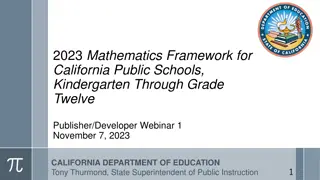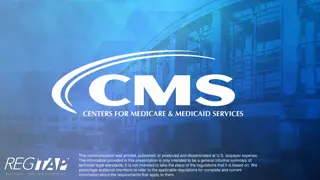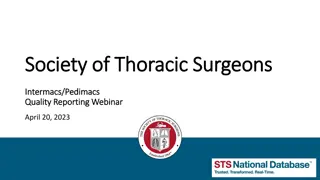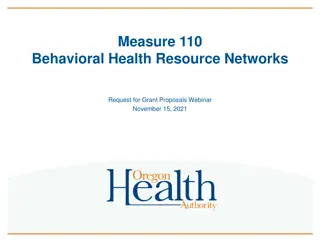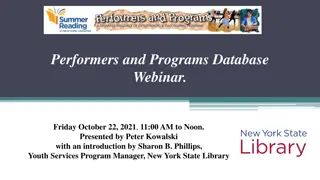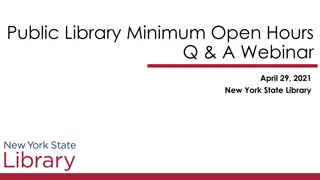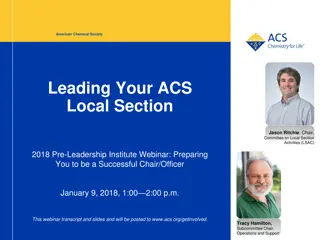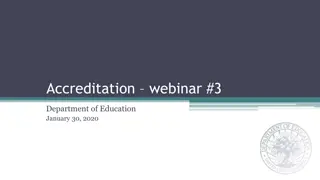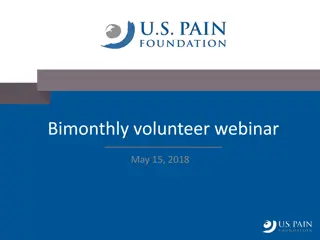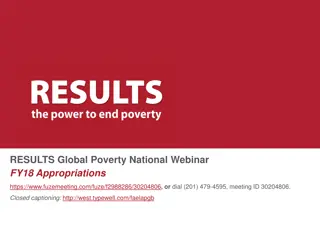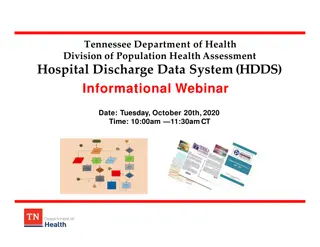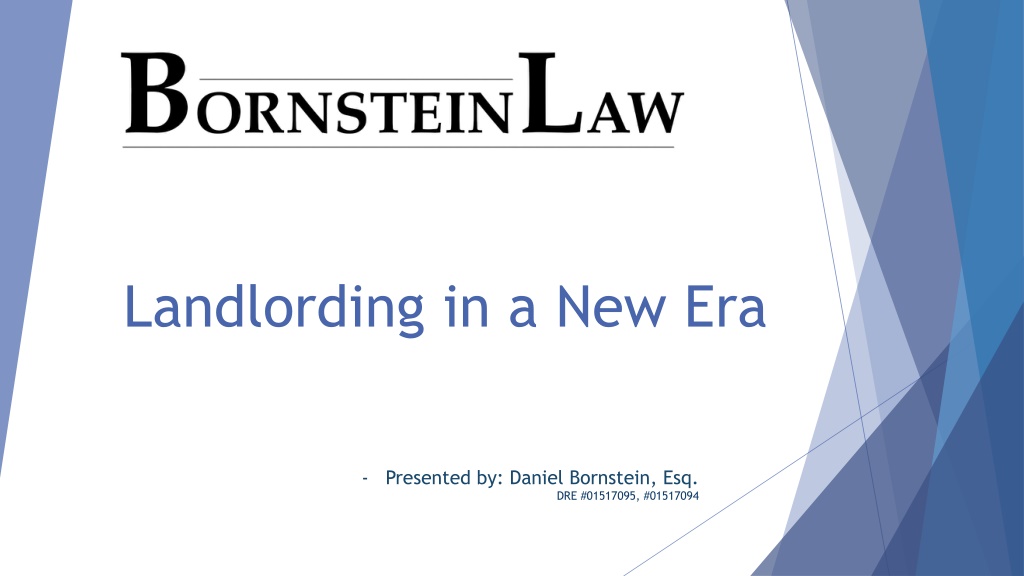
Navigating State Rent Control and Eviction Regulations
This comprehensive guide delves into the intricacies of state rent cap regulations, just cause evictions, exemptions, and tenant buy-outs. Covering topics such as maximum rent increases, exemption criteria, and permissible eviction reasons, this resource provides landlords with essential knowledge to navigate the evolving rental landscape effectively.
Download Presentation

Please find below an Image/Link to download the presentation.
The content on the website is provided AS IS for your information and personal use only. It may not be sold, licensed, or shared on other websites without obtaining consent from the author. If you encounter any issues during the download, it is possible that the publisher has removed the file from their server.
You are allowed to download the files provided on this website for personal or commercial use, subject to the condition that they are used lawfully. All files are the property of their respective owners.
The content on the website is provided AS IS for your information and personal use only. It may not be sold, licensed, or shared on other websites without obtaining consent from the author.
E N D
Presentation Transcript
Landlording in a New Era - Presented by: Daniel Bornstein, Esq. DRE #01517095, #01517094
State Rent CAP/Just Cause Tenant Buy- Outs Q&A Session
State Rent Cap/ Just Cause - General All Residential Rental Property (unless exempt) Tenants must be in possession for 12 or more months
State - Rent Cap Regulation (Retroactive to March, 15, 2019) Maximum rent increase in any twelve-month period: 5% plus CPI or 10% (whichever is lower) No more than 2 increases in any 12-month period
State Rent Cap - EXEMPTIONS Property already subject to rent control Condo/ Single family home : EXCEPT: WHERE CORPORATE OWNERSHIP; OR LLC OWNERSHIP WHERE ONE MEMBER IS A CORPORATION; OR REIT OWNERSHIP . Certificate of occupancy issued w/in the previous 15 years Public Housing Dormitories (Higher institution) Duplex where owner lives in one unit since beginning of tenancy Exemption: Disclosure requirements: MUST BE DISCLOSED IN LEASE EFFECTIVE JULY 2020
State - Just Cause Eviction Non-payment of rent Breach of Covenant CCP: 1161(3)* Nuisance CCP: 1161(4) Waste CCP: 1161(4) Failure to renew lease Criminal activity as provided by penal code Assignment Sublet CCP: 1161(4) Failure to provide access Unlawful purpose CCP: 1161(4) Tenant s failure to vacate after Tenant provides notice of termination Occupant s failure to vacate after termination of employment CCP: 1161(1) *Note: Tenant must be provided opportunity to cure; if not cured then notice to quit may issue
State Just Cause/No Fault Eviction OMI/RMI (Effective July 2020, lease must disclose right to OMI/RMI) Ellis Act Government requires property to be vacated Demolition/Substantial remodel Relocation requirement: Owner must provide one month rent waiver OR pay tenant one month s rent within 15 days of service of notice.
State Just Cause Eviction - EXEMPTIONS Property currently subject to a Just Cause Eviction Ordinance Property subject to eviction control enacted after Sept 1, 2019 is such law is more protective Condo/ Single family home: EXCEPT: WHERE CORPORATE OWNERSHIP; OR LLC OWNERSHIP WHERE ONE MEMBER IS A COPORATION; OR REIT OWNERSHIP Certificate of occupancy issued within previous 15 years Public housing entities Dormitories (Higher institution & K-12) Duplex if owner lives in one unit since beginning of tenancy Transient / tourist units Nonprofits, elder care; hospitals Tenant who is roommate of owner Owner Occupied SFH with ADU IF PROPERTY EXEMPT PER THE ABOVE MUST BE DISCLOSED IN LEASE EFFECTIVE JULY 2020
Disclosure Requirement Single Family/Condo (B) (i) The tenants have been provided written notice that the residential property is exempt from this section using the following statement: This property is not subject to the rent limits imposed by Section 1947.12 of the Civil Code and is not subject to the just cause requirements of Section 1946.2 of the Civil Code. This property meets the requirements of Sections 1947.12 (d)(5) and 1946.2 (e)(8) of the Civil Code and the owner is not any of the following: (1) a real estate investment trust, as defined by Section 856 of the Internal Revenue Code; (2) a corporation; or (3) a limited liability company in which at least one member is a corporation. (ii) For a tenancy existing before July 1, 2020, the notice required under clause (i) may, but is not required to, be provided in the rental agreement. (iii) For any tenancy commenced or renewed on or after July 1, 2020, the notice required under clause (i) must be provided in the rental agreement.
Rent Increases Disclosure Requirement An owner of residential real property subject to this section shall provide notice to the tenant as follows: (1) For any tenancy commenced or renewed on or after July 1, 2020, as an addendum to the lease or rental agreement, or as a written notice signed by the tenant, with a copy provided to the tenant. (2) For a tenancy existing prior to July 1, 2020, by written notice to the tenant no later than August 1, 2020, or as an addendum to the lease or rental agreement. (3) The notification or lease provision shall be in no less than 12-point type, and shall include the following: California law limits the amount your rent can be increased. See Section 1947.12 of the Civil Code for more information. California law also provides that after all of the tenants have continuously and lawfully occupied the property for 12 months or more or at least one of the tenants has continuously and lawfully occupied the property for 24 months or more, a landlord must provide a statement of cause in any notice to terminate a tenancy. See Section 1946.2 of the Civil Code for more information.
Disclosure Requirement Preserving Owner & Relative Move In Rights (2) No-fault just cause, which includes any of the following: (A) (i) Intent to occupy the residential real property by the owner or their spouse, domestic partner, children, grandchildren, parents, or grandparents. (ii) For leases entered into on or after July 1, 2020, clause (i) shall apply only if the tenant agrees, in writing, to the termination, or if a provision of the lease allows the owner to terminate the lease if the owner, or their spouse, domestic partner, children, grandchildren, parents, or grandparents, unilaterally decides to occupy the residential real property. Addition of a provision allowing the owner to terminate the lease as described in this clause to a new or renewed rental agreement or fixed- term lease constitutes a similar provision for the purposes of subparagraph (E) of paragraph (1).
Daniel Bornstein Kathryn Quetel Daniel Cheung Liana Ayrapetyan Dylan Tong SAN FRANCISCO: 507 Polk Street, Suite 310 San Francisco, CA 94102 P: 415-409-7611 F: 415-409-9345 OAKLAND: 482 W.MacArthur Blvd. Oakland, CA 94609 P: 510-836-0110 F: 510-836-0660 www.bornstein.law
THANK YOU! If you like to get a copy of today s presentation, You can download it at https://www.bornstein.law/recap/ SAN FRANCISCO: 507 Polk Street, Suite 310 San Francisco, CA 94102 p. 415-409-7611 f. 415-463-2349 OAKLAND: 482 W MacArthur Boulevard Oakland, CA 94609 p. 510-836-0110 f. 510-836-0660 www.bornstein.law


